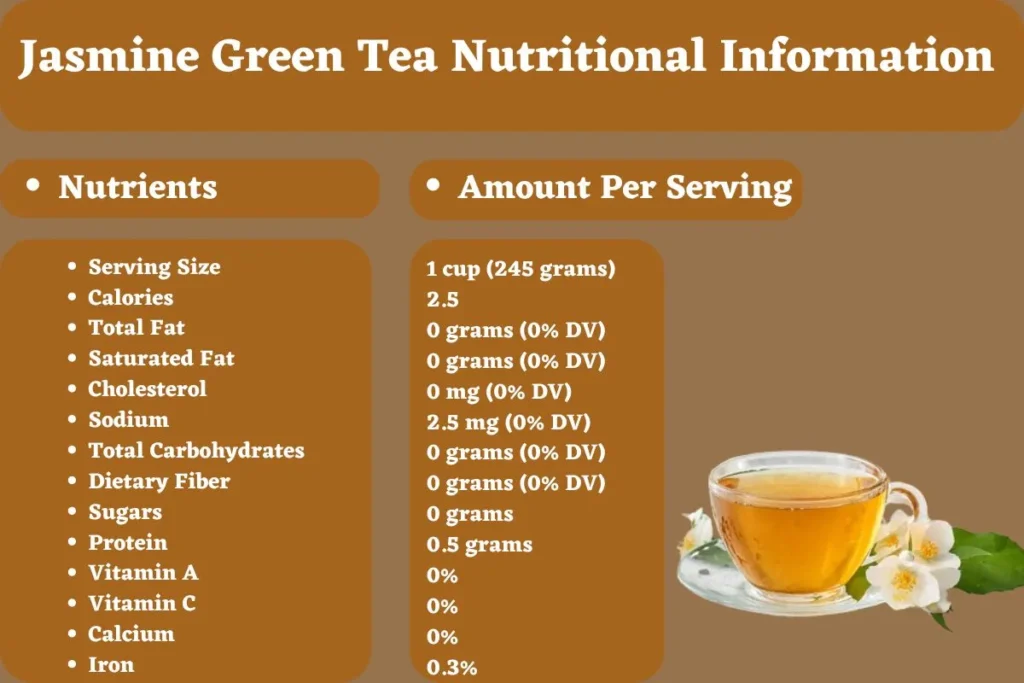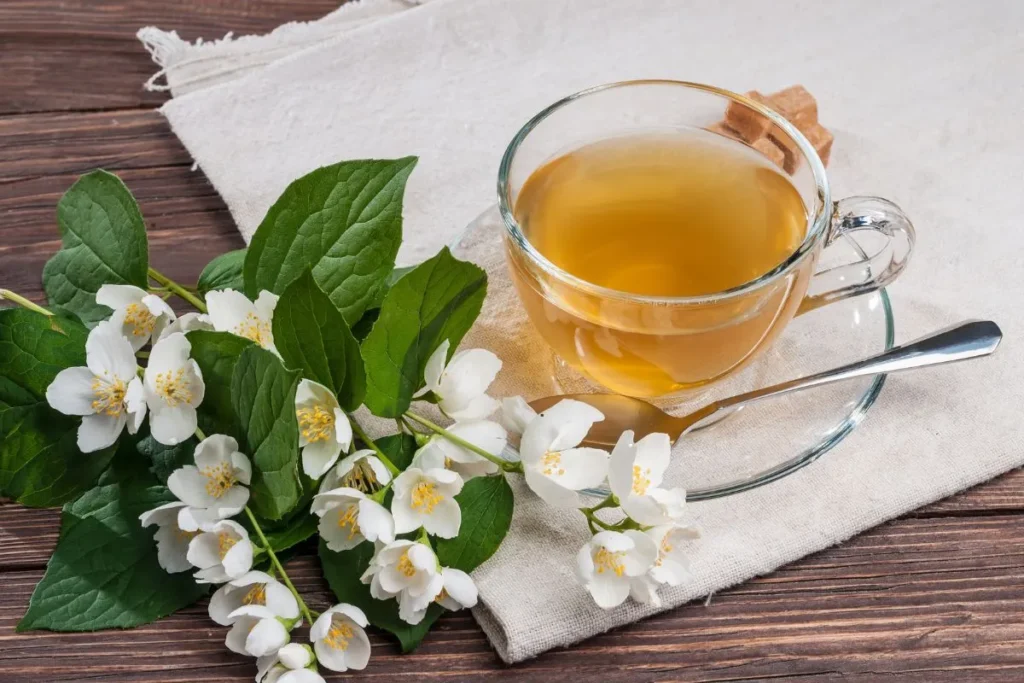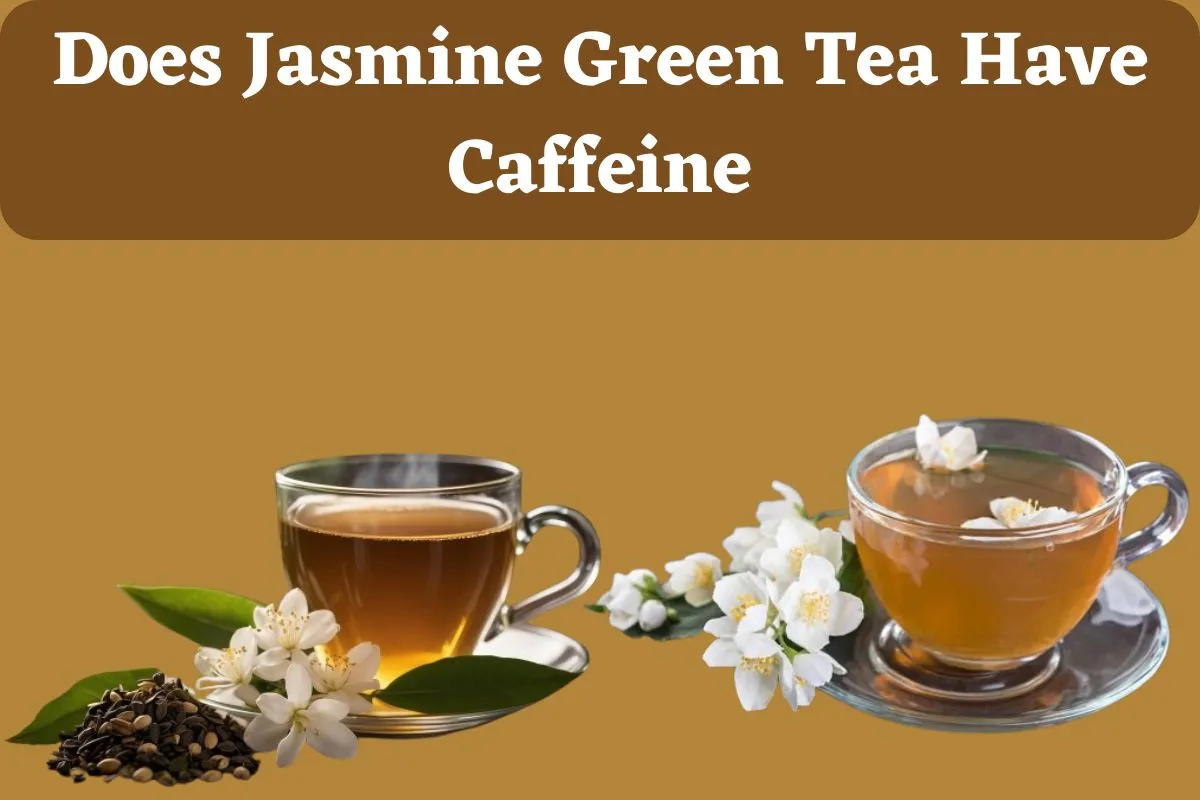Did you know the intoxicating floral scent of jasmine blossoms comes alive at night? That’s why they’re carefully harvested just before they open, ready to infuse their fragrance into delicate green tea leaves.
This creates the beloved jasmine green tea, a drink known for its sweet aroma and potential health benefits. But with the presence of green tea as its base, does jasmine green tea have caffeine? Let’s dive in and discover the answer.
Importance of Knowing Caffeine Content in Jasmine Green Tea
Jasmine green tea is a delicately scented tea created by infusing green tea leaves with the fragrant blossoms of the jasmine flower. This time-honored blend originated in China centuries ago and is now enjoyed globally for its refreshing taste and potential health benefits.
The tea offers several potential health benefits due to its rich content of polyphenols, particularly catechins such as epigallocatechin gallate (EGCG). These antioxidants may help reduce inflammation, improve heart health, and boost brain function.
Some studies suggest that green tea consumption may also aid in weight loss and lower the risk of certain cancers, although more research is needed to confirm these effects.
While jasmine itself doesn’t contain caffeine, the green tea base provides a gentle energy boost. This makes knowing the caffeine content of jasmine green tea important, especially for those sensitive to caffeine or with specific health concerns.
Individuals who should generally limit or avoid jasmine green tea include those with caffeine sensitivity, pregnant or breastfeeding women (consult a doctor), people with anxiety or sleep disorders, and those taking certain medications that might interact with caffeine.
Does Jasmine Green Tea Have Caffeine?
Yes, jasmine green tea has caffeine. It does contain caffeine, although in lesser amounts than other caffeinated beverages.
Green tea, which forms the base of jasmine green tea, is derived from the Camellia sinensis plant. This plant naturally produces caffeine, meaning any tea made from its leaves will contain some level of this stimulant.
While jasmine green tea has a significantly lower caffeine content than a standard cup of coffee (typically around 25-35mg per cup), it’s important to understand that it’s not entirely caffeine-free. This amount can still affect individuals with sensitivities or certain health conditions.
The exact caffeine content in your cup of jasmine green tea can be influenced by several factors.
- Type of Green Tea Used: Different varieties of green tea leaves naturally contain varying amounts of caffeine. Some teas are naturally higher in caffeine content. If a jasmine tea is made with a high-caffeine green tea as its base, the final product will contain more caffeine.
- Steeping Time: The longer jasmine green tea is steeped, the more caffeine is extracted from the leaves. Steeping for 1-2 minutes will produce a lower caffeine brew compared to a 5-minute steep.
- Amount of Tea Leaves: Using a larger quantity of tea leaves increases the surface area from which caffeine is released. More leaves mean a more caffeinated cup.
- Water Temperature: Hotter water draws out more caffeine from the tea leaves than cooler water. While jasmine green tea should not be brewed with fully boiling water (to avoid bitterness), even slight variations within the recommended temperature range can impact caffeine extraction.
- Leaf Quality and Grade: Whole-leaf teas generally have lower caffeine levels compared to broken leaf or tea dust. This is because the intact structure of whole leaves slows down caffeine release during infusion. Additionally, younger buds and tea tips often possess higher caffeine content than mature leaves.
If you love the floral notes of jasmine but want to avoid caffeine completely, consider delightful herbal infusions. Herbal teas naturally infused with jasmine blossoms offer a similar aromatic experience without any caffeine.
Jasmine Green Tea Variants and their Caffeine Content
Jasmine green tea
It is a popular scented tea that comes in various types, each with its unique characteristics and production methods. Some of the most common types of jasmine green tea include:
Fujian Jasmine Tea
Originating from the Fujian province in China, this tea is made by layering green tea leaves with fresh jasmine flowers, allowing the tea to absorb the delicate floral aroma. The process is repeated multiple times to ensure a strong, pleasant scent.
Jasmine Pearl Tea (Mo Li Long Zhu)
Also known as Dragon Pearl Jasmine Tea, this variety features hand-rolled green tea leaves shaped into small pearls. The pearls are scented with jasmine flowers, resulting in a visually appealing and flavorful tea.
Jasmine Silver Needle Tea
This premium tea combines white tea buds (Silver Needle) with jasmine flowers. The delicate white tea leaves provide a subtle, sweet flavor that compliments the jasmine aroma.
Jasmine Monkey King Tea
Named after the Chinese folk hero, this tea is made from high-quality green tea leaves scented with jasmine blossoms. It has a robust flavor profile and a strong jasmine aroma.
Jasmine Chun Hao Tea
This tea is made from Chun Hao green tea, known for its slightly sweet and nutty flavor. The tea leaves are scented with fresh jasmine flowers, creating a balanced and aromatic blend.
Yin Hao Jasmine Tea
Produced using a specific variety of green tea leaves called Yin Hao, this tea has a delicate flavor and a subtle jasmine scent. It is known for its light, refreshing taste.
Jasmine Bi Luo Chun Tea
Bi Luo Chun, or “Green Snail Spring,” is a famous Chinese green tea known for its spiral-shaped leaves. When scented with jasmine, it creates a tea with a sweet, floral aroma and a smooth flavor.
Jasmine Downy Pearls
Similar to Jasmine Pearl tea, these are made from young green tea leaves and buds that are rolled into pearls and scented with jasmine. They are known for their smooth, sweet flavor and strong floral fragrance.
Flavored Jasmine Tea
Some jasmine teas are enhanced with additional flavors such as vanilla, lemon, or other herbal infusions to create a unique blend. These are less traditional but can offer an interesting twist on the classic jasmine tea experience.
Jasmine Mao Feng
Crafted with larger green tea leaves, this variety offers a bolder green tea flavor that stands up to the prominent jasmine scent. The aroma is still floral and sweet, but you’ll also notice distinct grassy and vegetal notes from the green tea itself.
List of Ingredients in Jasmine Green Tea
Jasmine green tea typically consists of just two ingredients:
- Green tea leaves (Camellia sinensis): The base of jasmine green tea is made from the leaves of the Camellia sinensis plant, which is native to East Asia. The leaves are harvested and minimally processed to retain their natural green color and antioxidants.
- Jasmine flowers (Jasminum officinale): The distinct aroma and flavor of jasmine green tea come from the addition of jasmine flowers. The flowers are harvested during the blooming season, typically from summer to early autumn. They are then layered with the green tea leaves, allowing the tea to absorb the delicate floral scent.
Some lower-quality jasmine green tea blends may contain additional ingredients, such as:
- Jasmine essential oil or artificial jasmine flavor: In some cases, manufacturers may add jasmine essential oil or artificial jasmine flavor to the tea to enhance or standardize the aroma and taste. This is generally considered a lower-quality production method compared to natural jasmine scenting.
- Other tea varieties: Some blends may include other tea varieties, such as white tea (as in Jasmine Silver Needle Tea) or oolong tea, to create unique flavor profiles.
Jasmine Green Tea Nutritional Information

Jasmine green tea offers a virtually calorie-free and nutritious beverage option. A typical 1 cup (245 grams) serving contains approximately 2.5 calories. It has zero grams of fat (both saturated and total), cholesterol, and dietary fiber. You’ll also find that it carries no sugars and a negligible amount of sodium (approximately 2.5mg).
In terms of vitamins and minerals, while jasmine green tea doesn’t offer significant amounts of vitamin A or C, or calcium, it does provide a small amount of protein (0.5 grams) and a touch of iron (0.3%). Remember, these nutritional values are primarily derived from the green tea base, and adding sweeteners or milk will change the nutrition profile.
| Nutrition Facts | Amount Per Serving |
| Serving Size | 1 cup (245 grams) |
| Calories | 2.5 |
| Total Fat | 0 grams (0% DV) |
| Saturated Fat | 0 grams (0% DV) |
| Cholesterol | 0 mg (0% DV) |
| Sodium | 2.5 mg (0% DV) |
| Total Carbohydrates | 0 grams (0% DV) |
| Dietary Fiber | 0 grams (0% DV) |
| Sugars | 0 grams |
| Protein | 0.5 grams |
| Vitamin A | 0% |
| Vitamin C | 0% |
| Calcium | 0% |
| Iron | 0.3% |
Alternatives to Jasmine Green Tea and their Caffeine Content
The following are some substitutes for jasmine green tea:
Genmaicha
This Japanese green tea is blended with roasted brown rice, adding a unique toasty and nutty dimension to the green tea flavor profile. Genmaicha naturally contains less caffeine than a standard green tea, offering a gentler energy boost.
Matcha
Made by grinding whole green tea leaves into a fine powder, matcha boasts a vibrant green hue. It delivers a rich, slightly sweet flavor with a distinct umami quality. Due to consuming the whole leaf, matcha generally has a higher caffeine content than regular brewed green tea.
Hojicha
This Japanese green tea undergoes a roasting process, resulting in a mellow and earthy profile with sweet, caramel-like notes. Hojicha is a fantastic option for those desiring a lower caffeine content as roasting significantly reduces its levels.
White Tea
Crafted from young, minimally processed tea buds, white tea offers a delicate, naturally sweet flavor with subtle floral or fruity undertones. It provides a moderate dose of caffeine, typically less than black or green tea.
Oolong Tea
This semi-oxidized tea category presents a vast spectrum of flavors. You’ll find light and floral oolongs reminiscent of jasmine, along with richer, toastier varieties reminiscent of autumn leaves. Caffeine levels vary greatly depending on the specific oolong chosen.
Chamomile Tea
A timeless herbal infusion renowned for its soothing properties. Chamomile Tea‘s mild sweetness and gentle apple-like aroma make it a relaxing and comforting choice.
Rooibos Tea
Hailing from South Africa, this caffeine-free herbal teas offers a naturally sweet and earthy flavor profile with hints of vanilla and honey. Its rich red color and robust taste make it a delightful alternative.
Peppermint Tea
This invigorating classic delivers a refreshing burst of minty coolness. Known for aiding digestion, peppermint tea provides a naturally caffeine-free and revitalizing experience.
Hibiscus Tea
Its vibrant ruby red color and pleasantly tart flavor make hibiscus a visually appealing and palate-pleasing choice. Rich in antioxidants, hibiscus tea provides a boost of beneficial compounds without any caffeine.
Floral and Fruit Blends
Get creative with caffeine-free blends! Explore mixtures with lavender, rose petals, elderflower, lemongrass, or various dried fruits for unique flavor combinations. These blends often create an aromatic experience similar to the sweetness of jasmine tea.
| Tea Type | Caffeine Content (mg per cup) |
| Genmaicha | Approx. 20 |
| Matcha | Approx. 70 |
| Hojicha | Approx. 7.6 |
| White Tea | 15-39 |
| Oolong Tea | Variable (15-60) |
| Chamomile Tea | Caffeine-free |
| Rooibos Tea | Caffeine-free |
| Peppermint Tea | Caffeine-free |
| Hibiscus Tea | Caffeine-free |
| Floral and Fruit Blends | Caffeine-free |
Read Also:
👉Does Barley Tea Have Caffeine
👉Does Ginger Tea Have Caffeine
Recommended Daily Intake of Jasmine Green Tea

For most healthy adults, the caffeine level in jasmine green tea is considered moderate. A single cup provides roughly 6-9% of the 400mg recommended daily intake of caffeine. Individual sensitivities to caffeine can vary greatly.
While some people can easily tolerate multiple cups of jasmine green tea throughout the day, others might find even a single cup to be stimulating. It’s essential to be aware of your overall daily caffeine consumption from all sources, including coffee, other teas, and energy drinks.
Jasmine green tea can be a pleasant choice for those looking for a gentler energy boost or individuals who enjoy multiple cups of tea without exceeding their daily caffeine limits.
Conclusion
Does Jasmine Green Tea Have Caffeine? Its caffeine content is significantly lower than coffee or black tea, it’s important to remember that jasmine green tea is not entirely caffeine-free. If you have caffeine sensitivities or are concerned about your overall intake, it’s wise to enjoy jasmine green tea in moderation.
For those seeking a gentler source of caffeine coupled with floral aromas and potential health benefits, jasmine green tea is a delightful and delicious choice. As with any beverage, understanding its composition allows you to make informed choices that best suit your needs and preferences.
Frequently Asked Questions
Q1. Is jasmine green tea healthier than regular green tea?
Both jasmine green tea and regular green tea offer potential health benefits derived from their green tea base. These include antioxidants, possible heart health benefits, and a metabolism boost. The primary difference lies in jasmine’s floral aroma and delicate added sweetness, offering a sensory experience distinct from plain green tea.
Q2. Can I drink jasmine green tea before bedtime?
Due to the caffeine content in jasmine green tea (even though it’s lower than other caffeinated beverages), it’s generally best to avoid it close to bedtime if you are sensitive to caffeine. Caffeine can disrupt sleep patterns for some individuals. Opting for caffeine-free herbal teas like chamomile or rooibos is a safer choice for evening relaxation.
Q3. What are the side effects of jasmine tea?
Jasmine tea is generally considered safe for most people in moderation. The primary concern is caffeine content. Those with caffeine sensitivity might experience jitters, anxiety, or sleep disturbances. In very rare cases, individuals with jasmine allergies might have a mild reaction to jasmine tea.
Q4. Is it OK to drink jasmine tea every day?
Most healthy individuals can enjoy a moderate daily intake of jasmine green tea without issues. As with any caffeinated beverage, it’s essential to be mindful of your total caffeine consumption and individual sensitivity. Consulting a doctor is advisable if you have concerns about regular consumption in the context of existing medical conditions or medications.
Q5. Who should not drink jasmine tea?
Individuals with severe caffeine sensitivities, those pregnant or breastfeeding (consult a doctor), people with known allergies to jasmine, and anyone with health conditions that might be impacted by caffeine intake should exercise caution or avoid jasmine green tea. Consulting a doctor is recommended if you are unsure or have concerns.

Rossi Glover, the passionate Owner of Grand Lake Coffee, infuses every cup with her love for coffee and dedication to quality. With an extensive background in the art and science of coffee, Rossi is not just a connoisseur but a storyteller, sharing the intricate tales behind each brew.

